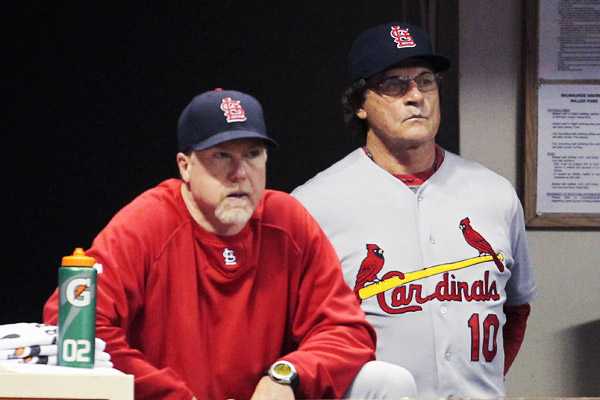 As Tony LaRussa walks away from a Hall of Fame career as a baseball manager, it's hard to argue with his methods that led to so much success for his players, both on and off the field.
As Tony LaRussa walks away from a Hall of Fame career as a baseball manager, it's hard to argue with his methods that led to so much success for his players, both on and off the field.Tim Keown of ESPN.com looks back on the career of Tony LaRussa.
There's a certain poetic justice to Tony La Russa's decision to retire after winning the World Series with a team that had no business winning one. There aren't many gaps in the man's résumé, but his third title filled one. He won when he should have won (1989), he lost when he should have won ('88 and '90), and now he's decided to walk away after a season in which he won the World Series in the most improbable manner. You could say 2011 cemented a legacy that dried and hardened years ago.
If you're looking to view the past 33 years of Major League Baseball through the eyes of one man, La Russa is the perfect tour guide. His old-school sensibilities (don't cross the man and expect it to be forgotten -- ever) meshed with the new-world thought processes to produce a dugout professor of Scholarly Medievalism.
He was a stat guy without being all wonky about it, redefining bullpen use in the late-1980s with a typically detailed, nearly compulsive precision. It was Gene Nelson for all or part of the eighth, Rick Honeycutt for a lefty or two and Dennis Eckersley to finish.
La Russa was willing to attempt the unconventional -- in some cases, the antithetical -- to get more out of his roster. Hitting the pitcher eighth in the lineup is destined to become the hallmark of his tradition-tweaking, but I'll fondly remember the "pod system" he briefly employed with a seriously flawed Oakland pitching staff in the mid-'90s. Instead of designating a starting pitcher, La Russa designated three pitchers for each game with the intention of coaxing three innings out of each. It didn't work, and it didn't last -- Doug Johns, John Wasdin and Ariel Prieto had something to do with that -- but it exemplified La Russa's congenital inability to fail conventionally.
And, before we get too sentimental, he presided over an Oakland team that became a traveling pharmaceutical show. He came away from that relatively unscathed, professing to know nothing and rarely being pressed. Like the commissioner and everyone else who was not directly implicated, La Russa escaped baseball's Great Drug War with a shrug and a how-was-I-supposed-to-know? After all, nobody expected him to join Mark McGwire and Jose Canseco in one of the dugout bathroom stalls. It was probably cramped with the two of them.
Which brings up another of La Russa's qualities: intense loyalty. (In fact, when discussing La Russa's qualities, it's understood that intense is the adjective of choice.) McGwire is the most obvious example. La Russa shepherded McGwire's public reintroduction, and it's not an exaggeration to assume that his prodding changed the man's life. Five years ago, it seemed unlikely that McGwire would ever appear in public. Now it's entirely possible he could end up working for another manager, in St. Louis or elswhere. That's nothing short of remarkable, and it has a lot to do with La Russa.
There's no doubt that La Russa could transition upstairs to the general manager's office if he felt the urge. Back before blogs and Twitter made instant news the scourge of baseball writing, La Russa's inside-baseball conversations became legendary among beat writers. His legacy exceeded the margins of the field.







No comments:
Post a Comment